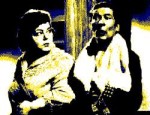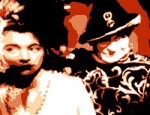Film Review
Filmed in the aftermath of the liberation of Italy by the Allies,
Due lettere anonime (a.k.a.
Two Anonymous Letters) is markedly
different from the films that director Mario Camerini made before the
war, crowdpleasing comedies such as
Darò
un milione (1937), many starring Italian heart-throb
Vittorio De Sica. A compelling war-time melodrama, the film has a
stark neo-realist feel to it, as befits its grim subject matter.
Camerini felt impelled to make the film as a reaction to the shameless
opportunism and collaboration that he had witnessed amongst his
countrymen for the duration of the Nazi occupation of Rome. A
bitter indictment of one of the more sordid periods in modern Italian
history, the film pulls no punches and offers an authentic and
revealing account of Roman attitudes during the occupation, the courage
of the partisans set against the self-serving duplicity of the
collaborators. Camerini brings a trenchant realism to the film
and is extremely well-served by his three lead actors, Clara Calamai,
Andrea Checchi and Otello Toso. Checchi and Toso make an
effective contrast as the heroic partisan Bruno and treacherous Tullio
respectively, but it is Calamai who has the greatest impact,
harrowingly convincing as the ordinary working woman who is driven by
conscience to reject the easy life and support the Italian resistance,
with all its attendant risks.
Due
lettere anonime makes an effective companion-piece to Roberto
Rossellini's
Roma, città aperta
(1945), both gripping war-time dramas heralding the arrival of a
dramatic sea change in Italian cinema.
© James Travers 2014
The above content is owned by frenchfilms.org and must not be copied.
Film Synopsis
Rome, 1943. Returning home on leave after serving on the Russian
front, Bruno has made up his mind to marry his girlfriend Gina.
Before he can propose to her he receives an anonymous letter which
reveals that, when he was away, Gina was carrying on an affair with
another man, Tullio, who runs a printing press. Disgusted, Bruno
rejects Gina and joins the partisans when the capital comes under Nazi
control after the declaration of the September amnesty. Gina
moves in to a new apartment with Tullio but soon discovers that he is
collaborating with the Nazis, betraying old friends for personal
advancement. Not long after Bruno is abducted, his partisans
friends receive an unsigned letter demanding a ransom. Gina
realises that this letter was written by the same hand that had earlier
disclosed her affair with Tullio...
© James Travers
The above content is owned by frenchfilms.org and must not be copied.



